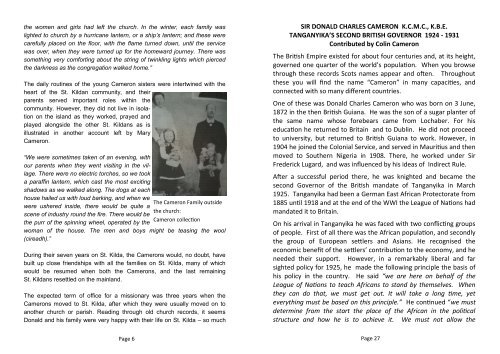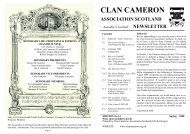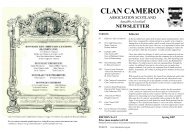Autumn 11 - The Clan Cameron Association Scotland.
Autumn 11 - The Clan Cameron Association Scotland.
Autumn 11 - The Clan Cameron Association Scotland.
Create successful ePaper yourself
Turn your PDF publications into a flip-book with our unique Google optimized e-Paper software.
the women and girls had left the church. In the winter, each family was<br />
lighted to church by a hurricane lantern, or a ship’s lantern; and these were<br />
carefully placed on the floor, with the flame turned down, until the service<br />
was over, when they were turned up for the homeward journey. <strong>The</strong>re was<br />
something very comforting about the string of twinkling lights which pierced<br />
the darkness as the congregation walked home.”<br />
<strong>The</strong> daily routines of the young <strong>Cameron</strong> sisters were intertwined with the<br />
heart of the St. Kildan community, and their<br />
parents served important roles within the<br />
community. However, they did not live in isolation<br />
on the island as they worked, prayed and<br />
played alongside the other St. Kildans as is<br />
illustrated in another account left by Mary<br />
<strong>Cameron</strong>.<br />
“We were sometimes taken of an evening, with<br />
our parents when they went visiting in the village.<br />
<strong>The</strong>re were no electric torches, so we took<br />
a paraffin lantern, which cast the most exciting<br />
shadows as we walked along. <strong>The</strong> dogs at each<br />
house hailed us with loud barking, and when we<br />
<strong>The</strong> <strong>Cameron</strong> Family outside<br />
were ushered inside, there would be quite a<br />
the church:<br />
scene of industry round the fire. <strong>The</strong>re would be<br />
<strong>Cameron</strong> collection<br />
the purr of the spinning wheel, operated by the<br />
woman of the house. <strong>The</strong> men and boys might be teasing the wool<br />
(cireadh).”<br />
During their seven years on St. Kilda, the <strong>Cameron</strong>s would, no doubt, have<br />
built up close friendships with all the families on St. Kilda, many of which<br />
would be resumed when both the <strong>Cameron</strong>s, and the last remaining<br />
St. Kildans resettled on the mainland.<br />
<strong>The</strong> expected term of office for a missionary was three years when the<br />
<strong>Cameron</strong>s moved to St. Kilda, after which they were usually moved on to<br />
another church or parish. Reading through old church records, it seems<br />
Donald and his family were very happy with their life on St. Kilda – so much<br />
Page 6<br />
SIR DONALD CHARLES CAMERON K.C.M.C., K.B.E.<br />
TANGANYIKA’S SECOND BRITISH GOVERNOR 1924 - 1931<br />
Contributed by Colin <strong>Cameron</strong><br />
<strong>The</strong> British Empire existed for about four centuries and, at its height,<br />
governed one quarter of the world’s population. When you browse<br />
through these records Scots names appear and often. Throughout<br />
these you will find the name “<strong>Cameron</strong>” in many capacities, and<br />
connected with so many different countries.<br />
One of these was Donald Charles <strong>Cameron</strong> who was born on 3 June,<br />
1872 in the then British Guiana. He was the son of a sugar planter of<br />
the same name whose forebears came from Lochaber. For his<br />
education he returned to Britain and to Dublin. He did not proceed<br />
to university, but returned to British Guiana to work. However, in<br />
1904 he joined the Colonial Service, and served in Mauritius and then<br />
moved to Southern Nigeria in 1908. <strong>The</strong>re, he worked under Sir<br />
Frederick Lugard, and was influenced by his ideas of Indirect Rule.<br />
After a successful period there, he was knighted and became the<br />
second Governor of the British mandate of Tanganyika in March<br />
1925. Tanganyika had been a German East African Protectorate from<br />
1885 until 1918 and at the end of the WWI the League of Nations had<br />
mandated it to Britain.<br />
On his arrival in Tanganyika he was faced with two conflicting groups<br />
of people. First of all there was the African population, and secondly<br />
the group of European settlers and Asians. He recognised the<br />
economic benefit of the settlers’ contribution to the economy, and he<br />
needed their support. However, in a remarkably liberal and far<br />
sighted policy for 1925, he made the following principle the basis of<br />
his policy in the country. He said “we are here on behalf of the<br />
League of Nations to teach Africans to stand by themselves. When<br />
they can do that, we must get out. It will take a long time, yet<br />
everything must be based on this principle.” He continued “we must<br />
determine from the start the place of the African in the political<br />
structure and how he is to achieve it. We must not allow the<br />
Page 27




